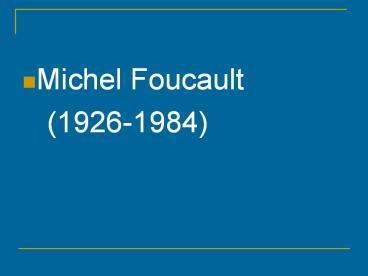Michel Foucault PowerPoint PPT Presentation
1 / 35
Title: Michel Foucault
1
- Michel Foucault
- (1926-1984)
2
- Influences post-structuralism, New Historicism,
cultural studies, queer theory, literature and
medicine, institutional bases of writers and
critics, identity formation. - (Norton 1615)
3
- 1961 Madness and Civilization
- 1963 The Birth of the Clinic
- 1966 The Order of Things
- (Les mots et les choses, une
archéologie des sciences humaines) - 1969 The Archaeology of Knowledge
- 1975 Discipline and Punish
- 1976 The History of Sexuality
4
Three Stages
- 1960s Archaeology ???
- 1970s Genealogy ???
- 1980s Ethics ???
5
Archaeology ???/???
- ?????????,?????????????????????,????????????,?????
????? ??????,??????,??????????,???????,??????????
?????(Foucault 1973b xxi, xxii qtd. in ??? 372) - ??, ????????????????
6
Madness
- ??? ?????????????,???????????????,?????????????,?
????????? - ?????? ??????????????????????????,???????????????
?????????? - ?? (??????) ??????,?????????????(????????????????
?????),?????????,???????????,???????????????,?????
???????,?????????(the Other) ?
7
Madness
- Madness ? discourse ??????????,???????????????????
????????,??? madness ? discourse
??????????????????,?????????????????,???????? - Foucault ???????,???? madness ?
discourse,?????????????? (???
21)
8
Genealogy ???
- ?? Nietzsche
- ??????(The will to power) ?????????????????
- ?????????????????????????????,??????????(local
knowledge) ,???????????????????,??????????????,???
?????????????????????????????????????????????????
???????????????????,?????????????????????????????
(??? 377-78)
9
Discipline and Punish ?????
- ??????????????????????????????????????????????,???
??????????????????????????????????????????????????
?????(??? 379)
10
Panopticism ??????
- ?????????????/?????????????????,????????????,????
???????? (Foucault)
11
Panopticism ??????
- ????????????,Foucault??????????????????,????????,?
?????????????,????????????(??? 379)
12
Jeremy Bentham's nineteenth-century prisonThe
"Panopticon"
http//www.cla.purdue.edu/academic/engl/theory/new
historicism/modules/foucaultcarceralmainframe.html
13
Prison cell
14
Prison school
http//www.cla.purdue.edu/academic/engl/theory/new
historicism/modules/foucaultcarceralmainframe.html
15
(Fludernik 44)
16
Ethics ???
- The History of Sexuality ??
- Foucault ???????? Freud ????????,???,????????????
??????? - (???)??????????????????
- (????)??????? (???????????????????????????????????
?????,?????) -
(??? 381-83)
17
- Foucault ?????,????????,???????,????????????????
????????????????????????????,????????????????????
?????????????,??????????????????,?????????????????
???? (??? 388-89)
18
- Key Terms
19
Discourse ??/??
- ???????????????????????????
- ???????????????(???????????????)????(????)?????,??
?????????,??????????????? - ??????????????????
- (???
19-20, 29)
20
Discourse ??/??
- Briefly, language as it is used by and within
various constituencies (the law, medicine, the
church, for example) for purposes to do with
power relationships between people.
(Wolfreys 65) - Discourse ideology in action
- (Dobie 170)
21
Discourse
- Human subjectivity and identity itself is
produced out of various discursive formations as
a result of the subjects entry into language. - Language is always already shot through and
informed by figurations and encryptions of power
. . . relationships and networks.
(Wolfreys 66)
22
Discourse
- Through discourse, knowledge power.
- Discourse disposes it puts everything in its
place. Modern power penetrates everywhere, giving
a specific name to every possible variant of
human action so as to master the world and leave
nothing unexamined, unknown, uncatalogued.
(Norton 1619)
23
Discursive Formation ????
- ?? (discourse)??????? or ???????(intertextuality)
(??? 29) - The principle of dispersion and redistribution
of discourse - A structurally interactive flow serving,
inescapably, a political or ideological function
(Wolfreys 69)
24
Epistémé ????
- ?? archive (??)
- ??????????????
- ????????????????
- ?????????????????????????Foucault
????????????????????,???????????
(??? 20)
25
Epistémé ????
- Deep-rooted, unconscious structures for
organizing knowledge. (Norton 1616) - The rules and constraints outside which
individuals cannot think or speak without running
the risk of being excluded or silenced.
(Dobie 170)
26
Genealogy (1)
- Describing the present through an analysis of the
forces that created it. (Norton 1616) - Genealogy does not claim to be more true than
institutionalized knowledge, but merely to be the
missing part of the puzzle. - http//www.california.com/rathbone/foucau10.
htm
27
Genealogy (2)
- It works by isolating the central components of
some current day political mechanism and then
traces it back to its historical roots. These
historical roots are visible to us only through
two separate bodies of genealogical knowledge
the dissenting opinions and theories that did not
become the established and the local beliefs and
understandings. http//www.california.com/rathbon
e/foucau10.htm
28
Power
- Depersonalized Power does not belong to anyone,
nor does it all emanate from one specific
location, such as the state. - Decentered Rather, power is diffused throughout
the capillaries (???) of the social system. -
(Norton 1618)
29
Power/Knowledge
- The production of knowledge is wedded to
productive power. Modern power requires
increasingly narrow categories through which it
analyzes, differentiates, identifies, and
administers individuals. (Norton 1620)
30
Body Politics
- Power operates through the daily disciplines and
routines to which bodies are subjected.
(Norton 1618)
31
Why is Foucault a post-structuralist?
- By focusing on the larger systematic social
forces, Foucault highlights the social
construction of the subject and thereby
deconstructs the self.
(Norton 1617)
32
Anti-humanism
- He objects to humanism, esp. its claim that we
are individuals with unique nature, possessing
coherent interior identities, motives, desires,
and conscious intentions. - (Norton 1617)
33
Counter-enlightenment
- Connected the rise of the individual with a
tremendous decrease in freedom. - In each case, an institution demands, examines
and watches over all subjects, and punishes
deviants. - Such a society is prisonlike, or carceral.
- (Norton
1618)
34
Anti-Marxism
- Foucault contends that since power operates in
innumerable places and taking many different
forms, there is no single privileged place for
the political activist to go to work, no locus of
power whose removal will bring the whole system
tumbling down. (Norton 1618)
35
References
- Dobie, Ann B. Theory into Practice.
Thomson/Heinle, 2002. - Fludernik, Monica. Carceral Topography
Spatiality, Liminality, and Corporeal in the
Literary Prison.Textual Practice, 1999 Spring
13 (1) 43-77. - Foucault, Michel ???????????????,1993?
- Leitch, Vincent B, ed. The Norton Anthology of
Theory and Criticism. 2001. - Wolfreys, Julian. Critical Keywords in Literary
and Cultural Theory. Palgrave Macmillan, 2004. - ????????????????2006?

